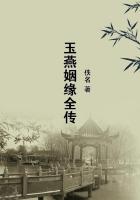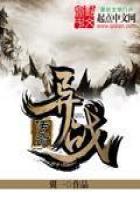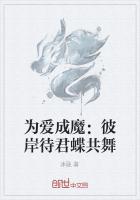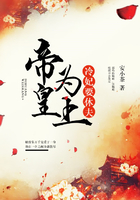The raging flood his farther flight restrains, Rais'd o'er the borders with unusual rains.
Prepar'd to plunge into the stream, he fears, Not for himself, but for the charge he bears.
Anxious, he stops a while, and thinks in haste;Then, desp'rate in distress, resolves at last.
A knotty lance of well-boil'd oak he bore;The middle part with cork he cover'd o'er:
He clos'd the child within the hollow space;With twigs of bending osier bound the case;Then pois'd the spear, heavy with human weight, And thus invok'd my favor for the freight:
'Accept, great goddess of the woods,' he said, 'Sent by her sire, this dedicated maid!
Thro' air she flies a suppliant to thy shrine;And the first weapons that she knows, are thine.'
He said; and with full force the spear he threw:
Above the sounding waves Camilla flew.
Then, press'd by foes, he stemm'd the stormy tide, And gain'd, by stress of arms, the farther side.
His fasten'd spear he pull'd from out the ground, And, victor of his vows, his infant nymph unbound;Nor, after that, in towns which walls inclose, Would trust his hunted life amidst his foes;But, rough, in open air he chose to lie;
Earth was his couch, his cov'ring was the sky.
On hills unshorn, or in a desart den, He shunn'd the dire society of men.
A shepherd's solitary life he led;
His daughter with the milk of mares he fed.
The dugs of bears, and ev'ry salvage beast, He drew, and thro' her lips the liquor press'd.
The little Amazon could scarcely go:
He loads her with a quiver and a bow;
And, that she might her stagg'ring steps command, He with a slender jav'lin fills her hand.
Her flowing hair no golden fillet bound;
Nor swept her trailing robe the dusty ground.
Instead of these, a tiger's hide o'erspread Her back and shoulders, fasten'd to her head.
The flying dart she first attempts to fling, And round her tender temples toss'd the sling;Then, as her strength with years increas'd, began To pierce aloft in air the soaring swan, And from the clouds to fetch the heron and the crane.
The Tuscan matrons with each other vied, To bless their rival sons with such a bride;But she disdains their love, to share with me The sylvan shades and vow'd virginity.
And, O! I wish, contented with my cares Of salvage spoils, she had not sought the wars!
Then had she been of my celestial train, And shunn'd the fate that dooms her to be slain.
But since, opposing Heav'n's decree, she goes To find her death among forbidden foes, Haste with these arms, and take thy steepy flight.
Where, with the gods, averse, the Latins fight.
This bow to thee, this quiver I bequeath, This chosen arrow, to revenge her death:
By whate'er hand Camilla shall be slain, Or of the Trojan or Italian train, Let him not pass unpunish'd from the plain.
Then, in a hollow cloud, myself will aid To bear the breathless body of my maid:
Unspoil'd shall be her arms, and unprofan'd Her holy limbs with any human hand, And in a marble tomb laid in her native land."She said.The faithful nymph descends from high With rapid flight, and cuts the sounding sky:
Black clouds and stormy winds around her body fly.
By this, the Trojan and the Tuscan horse, Drawn up in squadrons, with united force, Approach the walls: the sprightly coursers bound, Press forward on their bits, and shift their ground.
Shields, arms, and spears flash horribly from far;And the fields glitter with a waving war.
Oppos'd to these, come on with furious force Messapus, Coras, and the Latian horse;These in the body plac'd, on either hand Sustain'd and clos'd by fair Camilla's band.
Advancing in a line, they couch their spears;And less and less the middle space appears.
Thick smoke obscures the field; and scarce are seen The neighing coursers, and the shouting men.
In distance of their darts they stop their course;Then man to man they rush, and horse to horse.
The face of heav'n their flying jav'lins hide, And deaths unseen are dealt on either side.
Tyrrhenus, and Aconteus, void of fear, By mettled coursers borne in full career, Meet first oppos'd; and, with a mighty shock, Their horses' heads against each other knock.
Far from his steed is fierce Aconteus cast, As with an engine's force, or lightning's blast:
He rolls along in blood, and breathes his last.
The Latin squadrons take a sudden fright, And sling their shields behind, to save their backs in flight Spurring at speed to their own walls they drew;Close in the rear the Tuscan troops pursue, And urge their flight: Asylas leads the chase;Till, seiz'd, with shame, they wheel about and face, Receive their foes, and raise a threat'ning cry.
The Tuscans take their turn to fear and fly.
So swelling surges, with a thund'ring roar, Driv'n on each other's backs, insult the shore, Bound o'er the rocks, incroach upon the land, And far upon the beach eject the sand;Then backward, with a swing, they take their way, Repuls'd from upper ground, and seek their mother sea;With equal hurry quit th' invaded shore, And swallow back the sand and stones they spew'd before.
Twice were the Tuscans masters of the field, Twice by the Latins, in their turn, repell'd.
Asham'd at length, to the third charge they ran;Both hosts resolv'd, and mingled man to man.
Now dying groans are heard; the fields are strow'd With falling bodies, and are drunk with blood.
Arms, horses, men, on heaps together lie:
Confus'd the fight, and more confus'd the cry.
Orsilochus, who durst not press too near Strong Remulus, at distance drove his spear, And stuck the steel beneath his horse's ear.
The fiery steed, impatient of the wound, Curvets, and, springing upward with a bound, His helpless lord cast backward on the ground.
Catillus pierc'd Iolas first; then drew His reeking lance, and at Herminius threw, The mighty champion of the Tuscan crew.
His neck and throat unarm'd, his head was bare, But shaded with a length of yellow hair:
Secure, he fought, expos'd on ev'ry part, A spacious mark for swords, and for the flying dart.
Across the shoulders came the feather'd wound;Transfix'd he fell, and doubled to the ground.



